 Petzlover
Petzlover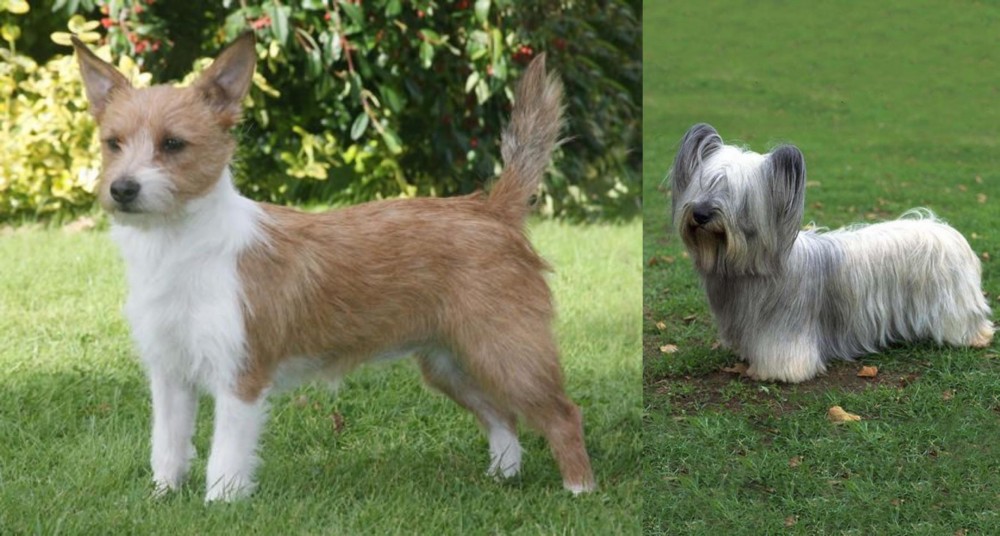 Portuguese Podengo is originated from Portugal but Skye Terrier is originated from United Kingdom. Both Portuguese Podengo and Skye Terrier are having almost same height. Portuguese Podengo may weigh 12 kg / 26 pounds lesser than Skye Terrier. Both Portuguese Podengo and Skye Terrier has almost same life span. Portuguese Podengo may have more litter size than Skye Terrier. Portuguese Podengo requires Low Maintenance. But Skye Terrier requires Moderate Maintenance
Portuguese Podengo is originated from Portugal but Skye Terrier is originated from United Kingdom. Both Portuguese Podengo and Skye Terrier are having almost same height. Portuguese Podengo may weigh 12 kg / 26 pounds lesser than Skye Terrier. Both Portuguese Podengo and Skye Terrier has almost same life span. Portuguese Podengo may have more litter size than Skye Terrier. Portuguese Podengo requires Low Maintenance. But Skye Terrier requires Moderate Maintenance
 The Portuguese Podengo is an ancient hound dog from Portugal. It is available as a small dog, medium and large dog.
The Portuguese Podengo is an ancient hound dog from Portugal. It is available as a small dog, medium and large dog.
The coats can be short and smooth or longer and wiry. They were imported into the United States in the 1990's and they are also recognized by the Federation Cynologique Internationale in Europe. They are also recognized by the United Kennel Club. In America they are part of the Rare Breed Association.
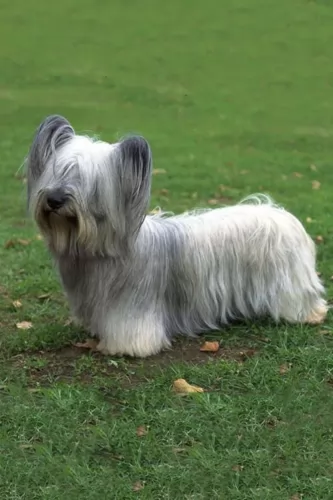 The Skye Terrier is a hardy dog breed and is actually considered to be an endangered native dog breed in the United Kingdom.
The Skye Terrier is a hardy dog breed and is actually considered to be an endangered native dog breed in the United Kingdom.
They were found on the Isle of Skye, although there is some confusion about its history. They were used long ago to hunt but these days they are essentially companion dogs.
They found their way to America and the Skye Terrier Club of America was founded in 1938. The American Kennel Club recognized the breed in 1887.
 The Portuguese Podengo is available in three sizes. He stands roughly at between 20 to 30 cm and weighs between 4.1 to 5.9 kg. The dog is similar in looks to other hunting dogs native to the Mediterranean, such as the Pharoah Hound.
The Portuguese Podengo is available in three sizes. He stands roughly at between 20 to 30 cm and weighs between 4.1 to 5.9 kg. The dog is similar in looks to other hunting dogs native to the Mediterranean, such as the Pharoah Hound.
They are small to medium sized dogs. The eyes are brown, the ears are erect and the tail long and thick, held low and with a bit of a curve when at rest.
The body of the dog is lean and well muscled and the head wedge shaped. The coat is essentially short and smooth though you also get the longer, wiry coat. The coat is found in shades of fawn or yellow and with some white markings.
This Portuguese sighthound is energetic, comical sometimes, sweet and loving. Being alert, he also makes a good watchdog.
He is intelligent, he is easily trained and socialized and gets on well with children in the house if they have been disciplined to respect and be kind to animals.
He is somewhat aloof around strangers and this is actually what makes him a good watchdog.
It is said that the Portuguese Podengo isn't bred to be a companion dog, being bred exclusively as a working hunting dog. This explains why it doesn’t have such a ‘companionable’ temperament as some other dog breeds.
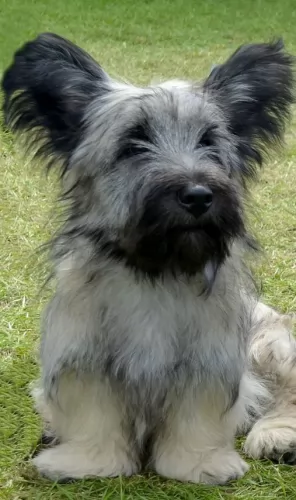 The Skye Terrier is a medium-sized dog standing at between 23 and 26cm in height and weighing between 12 and 18kg. The legs are short and sturdy. He is double coated with the top coat being straight and hard and forming a beard around the face area. The coat can be fawn, and in various shades of grey which are sometimes even black. The ears of the dog are medium sized and erect.
The Skye Terrier is a medium-sized dog standing at between 23 and 26cm in height and weighing between 12 and 18kg. The legs are short and sturdy. He is double coated with the top coat being straight and hard and forming a beard around the face area. The coat can be fawn, and in various shades of grey which are sometimes even black. The ears of the dog are medium sized and erect.
The Skye Terrier has always been a hunting dog and he enjoys quite a bit of exercise – walks, ball games as well as indoor games. Small though he may be, he is strong willed with a mind of his own and will benefit from being trained and socialized.
This is also necessary as he has a fairly reserved nature. He gets on well with children and makes an excellent family pet but he is ready to take on smaller pets in the home. He will bark when confronting strangers and makes an excellent watchdog too.
He is able to adapt well into life in the city or the countryside. He isn’t a dog to be left outside day after day and will just die of boredom, frustration and loneliness.
 The Portuguese Podengo loves pleasing his human owners – loving to be in the company of his human family.
The Portuguese Podengo loves pleasing his human owners – loving to be in the company of his human family.
He is an independent dog who will benefit from training and socialization. He is wary around strangers, but this makes him a good watchdog.
He loves lots of exercise and will want mental and physical stimulation to be happy and content and as bright as he is.
Provide him with good care and he promises to make you a wonderful pet and companion.
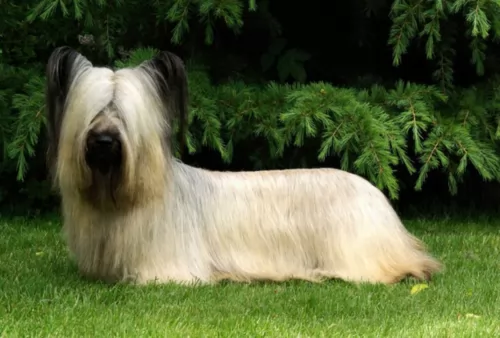 Give the Skye Terrier the attention he wants and he will reward you with his loving companionship.
Give the Skye Terrier the attention he wants and he will reward you with his loving companionship.
He loves the entire family but is best suited to homes where children have been taught to be kind to animals and to treat them with respect.
He has moderate energy levels and will expect you to give him a fair amount of exercise. The Skye Terrier can make an excellent companion for you and your family.
 The Portuguese Podengo is a robust, healthy dog that can get to 14 years of age if he is looked after well and exercised.
The Portuguese Podengo is a robust, healthy dog that can get to 14 years of age if he is looked after well and exercised.
The dog doesn’t battle with genetic disorders. It is thought that the most common problems with this dog are the injuries he gets from being such an outdoor, hunting dog. He could well rip his nail or have porcupine quills in his muzzle.
Some common dog diseases to be aware of are cancer, bloat,skin diseases and eye problems.
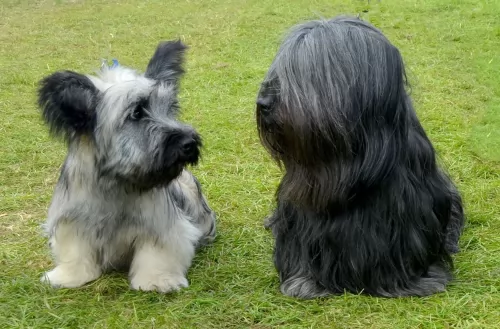 The Skye Terrier is a healthy dog breed. Perhaps the only issue that could be a problem with him is orthopedic problems. He is an achondroplastic dog, meaning a large body on small legs.
The Skye Terrier is a healthy dog breed. Perhaps the only issue that could be a problem with him is orthopedic problems. He is an achondroplastic dog, meaning a large body on small legs.
He could develop spinal problems if he were allowed to constantly be jumping off beds and high chairs.
Orthopedic problems affect the bones, muscles and joints and can actually be debilitating. Orthopedic conditions can be ligament tears or hip dysplasia for instance, accompanied by arthritis.
You’ll notice your dog has an abnormal way of walking or running, inability to get up once lying down and he may have arthritis and pain.Be careful because obesity can trigger problems with the joints and bones.
 The Podengo is always game and ready for a good time and likes nothing more than a good walk as well as the chance to get off his leash and have a bit of free time. He also loves ball games, being pulled along while he holds tightly on to a piece of rope and he loves darting back and forwards with a frisbee.
The Podengo is always game and ready for a good time and likes nothing more than a good walk as well as the chance to get off his leash and have a bit of free time. He also loves ball games, being pulled along while he holds tightly on to a piece of rope and he loves darting back and forwards with a frisbee.
Many things can change a dog’s longevity, and diet is one. A good nutritious diet with vitamins and minerals will give your dog less of a chance to get sick. If you go for the best quality commercially manufactured dog foods, you’ll find they are both convenient and well balanced.
To provide your dog with just a bit of variety in his diet, some home-made food added into the dry kibble from time to time will delight your pet.
No need to make preparing the food a huge issue either. Boil brown rice and chicken in a pot and add in sweet potatoes, carrots and spinach. Chop all this up and as a treat, add smaller portions of it into the dry kibble. This is a real treat for your dog. You’ll see his thanks in his bright eyes and wagging tail.
Try to include a bit of raw meat occasionally and never let your dog be without a constant source of fresh, cool water.
Make sure his puppy vaccines are up to date.
Have your dog spayed or neutered if you don’t want your dog being a parent.
Provide your dog with a warm, dry, comfy pace to sleep.
Trim his nails and check inside his ears for redness and infection.
Check for fleas and ticks when you brush him.
Get him to the vet when you can see he s sick.
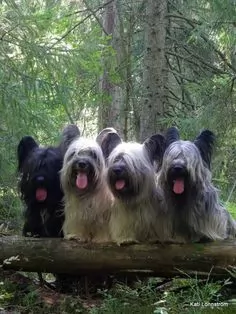 ● The coat of the Skye Terrier is long and silky and will most certainly require brushing every day if you keep the hair long. Such silky hair can easily become matted.
● The coat of the Skye Terrier is long and silky and will most certainly require brushing every day if you keep the hair long. Such silky hair can easily become matted.
● Little dogs like this will need their teeth being checked regularly. You can even try to buy special pet toothpaste and toothbrush and brush his teeth yourself. If you prefer, a professional dog groomer can do this for you and at the same time trim his nails and check his ears and clean the insides of the ears too to avoid infection.
● Provide him with top quality food as the quality of the dog food you buy makes a huge difference to his health and longevity. He is a small dog and there are some excellent commercially manufactured dog foods specially made for small, energetic dogs.
Try to include some home-made food for him which can be simply mixed into the dry kibble twice a week. Boiled chicken, brown rice or pasta and spinach, sweet potatoes and carrots is super tasty and nutritious. Ensure there is always a bowl of fresh, cool water within his reach.
● Keep his vaccines up to date against some deadly canine diseases, and get him to the vet when he shows signs of illness.